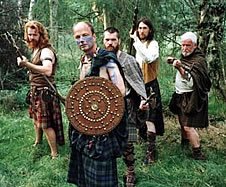
When the Romans conquered the Celts, showing a distinct lack of the requisite Celtic spirit, they added their own touches to the Samhain festival, such as making centerpieces out of apples and nuts for Pomona, the Roman goddess of the orchards. Cute, huh? The Romans also bobbed for apples and, again, showing an utter absence of Celtic spirit, drank cider! So, where, you might ask, does the Christian aspect of the holiday begin? Well, in 835, Pope Gregory IV moved the celebration for all martyrs (later all saints) from May 13 to November 1. The night before became known as All Hallow’s Eve or "holy evening." Eventually the name was shortened to the current Halloween. Then, on November 2, the Church celebrates All Souls Day in commemoration of all the faithful departed. Therefore, it is also important to assist at Mass on that day and pray for your dead, too.
The purpose of these feasts is to remember saints, both those canonized those who are not, which, I would say are most of the holy ones in heaven, as well as all the faithful departed. Hence, the name All Souls for 2 November's feast. My oldest daughter's baptism day is All Souls, which I think is really cool! The three days constitute a festival that celebrates the communion of saints, and reminds us that the Church is not bound by space or time. All Saints, I do not hesitate to add, is holy day of obligation. Furthermore, it has not been moved to the nearest Sunday, Deo Gratias!
On Sundays and holy days of obligation, the Code of Canon Law tells us, in Canon 1247 the faithful are obliged to participate in the Mass.
Moreover, they are to abstain from those works and affairs which hinder the worship to be rendered to God, the joy proper to the Lord’s day, or the suitable relaxation of mind and body.
Can. 1248 §1. A person who assists at a Mass celebrated anywhere in a Catholic rite either on the feast day itself or in the evening of the preceding day satisfies the obligation of participating in the Mass.
§2. If participation in the eucharistic celebration becomes impossible because of the absence of a sacred minister or for another grave cause, it is strongly recommended that the faithful take part in a liturgy of the word if such a liturgy is celebrated in a parish church or other sacred place according to the prescripts of the diocesan bishop or that they devote themselves to prayer for a suitable time alone, as a family, or, as the occasion permits, in groups of families.

So, have great time tonight. Isn't it nice not have to be puritanical about Halloween, protesting that it is pagan, un-Christian, and being forced to go to harvest festivals? Good heavens, dress up, go to a party, have a scotch and beer- in moderation, of course. As you celebrate, be grateful for love and life, be mindful of all those who came before you, especially your own ancestors, who, despite their sins and faults, played their part in God's providential plan, and, not least, were necessary in order for to exist.


No comments:
Post a Comment